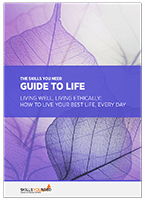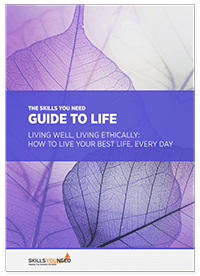Self-Control | Self-Mastery
See also: Self MotivationSelf-control is the ability to control oneself, in terms of having mastery over one’s desires and appetites. Those who are self-controlled can temper what they want, to ensure that they do not over- or under-indulge.
St Thomas Aquinas, a medieval philosophy and theologian, said that self-controlled people were able to ‘preserve their lives’. In other words, they were able to do the right things to keep themselves healthy and happy.
Three Habits of Self-Control
The self-controlled man craves for the things he ought, as he ought, and when he ought.
Aristotle
Self-controlled people can be thought of as having acquired three habits:
1. Self-Preservation
They have a healthy attitude towards ‘things’ and focus on what they need in order to live, rather than what they want. They use what they need to enrich their lives, but do not over-indulge. They do not try to exploit others in any way.
2. Self-Assertion
They know their own value, and are comfortable in saying what they think in a way that allows others to speak too. They are firm but gentle with others, and do not put themselves or others down.
See our pages on Assertiveness for more information.
3. Self-Fulfilment
The way to self-fulfilment is closely linked to resilience. Those with self-control are able to understand that it is important to persevere with difficult activities if you are to develop skill in them. However, if you do persevere, you will learn the skill and will get pleasure from it.
Examples of skills which may not come easily but which give huge pleasure include drawing and other forms of visual art, learning to play a musical instrument and studying a new subject for interest.
Fundamentally, self-control allows us to enjoy the good things of life in moderation, without wanting too much, and knowing when we have had enough.
Defining Self-Control
The basic premise of self-control is the use of reason to control instinct, whether that instinct is for something bad or against something that is good for us.
In an age of instant gratification, it is perhaps an unusual and under-valued quality but, nonetheless, one worth striving for.
You will know that you need to exercise self-control when you feel either:
Overwhelming desire to do something pleasurable, which you know is not good for you, especially in excess; or
Disgust at the idea of doing something, especially if you know it is good for you.
Self-Control and Addiction
It is worth saying at this point that addiction can in no way be considered a failure of self-control. Although there are different opinions about whether addictions like sex addiction actually exist, there is no question that it is possible to become genuinely addicted to particular substances, such as drugs or alcohol, or certain behaviours. Addicts cannot just ‘pull themselves together’. Instead, they need clinical help, advice and support, or even medication.
This applies equally to those who feel an excessive desire for something which is bad for them, like food or alcohol, suffer from eating disorders such as anorexia, and those who have unusual or socially unacceptable desires such as necrophilia.
Assessing your Self-Control
You can get an idea of your levels of self-control by thinking about something that you really want, whether food, drink, or object. You might, for example, feel that you really love chocolate.
Now give yourself a rating from one to ten for:
How much you really want that something, on the right occasions, and in the right amounts;
The strength of the pleasure that you get from buying, eating or otherwise possessing it; and
How disappointed you would be if you couldn’t have it.
Consider whether you feel that you are governed by your desire for that thing (for example, you might find yourself saying ‘I really have to have some chocolate right now’).
Pained by not being able to have it (for example, ‘I’ve gone a whole day without being able to buy any chocolate because the shop was closed. That’s really spoiled my day’).
In control (for example, ‘I haven’t had any chocolate for a few days, so a bar wouldn’t hurt, but perhaps I’ll leave it until tomorrow because I had a piece of cake earlier’).
Going through a process like this will help you to assess whether your desire is appropriate, or excessive, and whether or not to indulge in what you want.
Warning!
Wanting the wrong things is NEVER a good thing. Whether that is wanting something that is legally, morally or ethically wrong, or simply actively bad for you, it’s always a problem.
A Slight Diversion: Shame
If you do something which you know you should not do, such as overeat or drink too much, you may feel ashamed.
Shame is generally driven by a sense of personal disappointment at having let ourselves down, and is therefore helpful in developing better self-control. Next time you are tempted, try to remember how ashamed you were last time,and that will help you to exercise the necessary self-restraint.
Developing Self-Control
We said before that self-control is about using reason to master instinct.
There are a number of questions to ask yourself when you really want something that will help you to apply reason to your desire.
These include:
What sort of things do you want, and how many? Do you desire a reasonable amount, too many or too few? It’s reasonable to want a few things but, if as soon as you get something you’re looking for the next, that’s not so good. And if you want something in such large quantities that it affects your health or well-being, that’s also bad news.
How much do you want the object? How far would you go to get it? If you would do something illegal, or put yourself in debt, to obtain it, that’s much too strong.
How much enjoyment do you get out of it? Do you enjoy it enough to make it worthwhile, or simply move on to wanting more or something else?
When do you satisfy the desire appropriately? Is now a good time, or would ‘later’ or another occasion be more appropriate?
How much pain does it cause you not to satisfy the desire? Is it excessive to the extent that it is damaging your enjoyment and that of other people?
Applying reason to all these can help you to apply self-control when you need to do so.
Further Reading from Skills You Need
The Skills You Need Guide to Life: Living Well, Living Ethically
Looking after your physical and mental health is important. It is, however, not enough. Maslow’s famous hierarchy of needs suggests that most of us need more than that. We need to know that we are living our ‘best life’: that we are doing all we can to lead a ‘good life’ that we will not regret later on.
Based on some of our most popular content, this eBook will help you to live that life. It explains about the concepts of living well and ‘goodness’, together with how to develop your own ‘moral compass’.
Finding the Balance
Self-control is not about total abstinence, it’s about finding the right balance for you.
There is an old saying that ‘a little bit of what you fancy does you good’, and provided that it is not illegal or actually damaging, that is almost certainly true. Denying yourself what you need is as bad as over-indulging. It will certainly quickly remove quite a lot of joy from your life.
You can find the right balance by thinking through your desires using the questions above, and considering what ‘too little’, ‘too much’ and ‘just right’ would look like.
Once you know, you can strive for ‘just right’ and you are well on the way to developing self-control.


